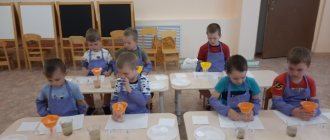Organizational aspects
- It is necessary to unite the children and make friends. This applies to new groups. The guys don’t know each other yet, so it’s better to immediately accustom them to certain rules of behavior in a given place and at a given time. And the easiest way to do this is during playful, creative and entertaining activities.
- In groups where children are already familiar with each other, it is necessary to monitor their relationships, track their social roles, and, if necessary, adjust the behavior of preschoolers.
There is a very simple test.
Children are offered flowers cut out of paper (balls, suns, stars, etc.) of different sizes, from very small to large. And the task is given: choose a flower or an image that is involved in the test, and place it on a sheet of Whatman paper (on a table or some other surface).
The teacher can be the first to take the picture and place it anywhere. Next, you need to analyze the children's choices. Some will choose the largest flowers and place them in the center, others will want to stick the flower closer to the teacher.
Mostly, children place flowers next to other flowers. But there are also those who will choose the smallest flowers and put them in the corner. It is these kids that you will need to pay special attention to. They clearly feel lonely, almost outcasts; such guys are shy and often have low self-esteem.
- It is imperative to use an individual approach and take into account age characteristics in your work. It is logical to assume that entertainment for children in the middle group should be more difficult than for the younger group. In this case, leisure activities will be more conducive to the objectives of the child’s full development.
So, if a teacher knows the group, has studied the children, and has chosen an approach to each child, he can successfully organize their leisure time. What can we offer to preschoolers?
Types of entertainment in kindergarten
Associated with various holidays
- State and international , for example, New Year, Children's Day, February 23, March 8, Mother's Day, Victory Day, etc.
- Orthodox, folk, folklore , for example, Christmas, Trinity, Christmastide, Maslenitsa, etc.
- Holidays that are traditionally celebrated in this institution, for example, birthdays, graduations, etc.
- Holidays that are not tied to any date are held exclusively for the joy of children, for example, physical education activities, a party of balloons or soap bubbles.
Associated with the time of year
- In the fall, children either come to kindergarten for the first time or return to their old group. In any case, they go through primary or repeated adaptation to the new rhythm of life. You can organize a “Farewell to Summer” holiday, a drawing competition about summer. It will be useful to observe nature.
- Winter activities in kindergarten include outdoor games (slideslides, snowball fights, building a snowman and other objects, drawings in the snow, winter Olympic games, etc.), as well as indoor activities (cutting out snowflakes, KVN on a winter theme, learning poetry, conversations about winter traditions with a short excursion into history, etc.)
- In spring you can organize nature observation. Let each child choose which tree, twig, or bush he will watch. It will be good to correlate these observations with the autumn ones.
- In summer, outdoor sports activities for preschoolers are especially popular, as well as games in the sandbox, which can be organized in the form of a competition.
Related to the type of activity and its content
- Theatrical activities develop children's artistic talents, teach them to liberate themselves and not be afraid to speak in front of an audience. This could be participation in a play, a puppet theater, or acting out scenes using magnetic figures. This also includes any role-playing games.
- Musical and literary classes develop aesthetic taste and the desire for beauty. This includes listening to musical works, reciting by heart (reading competition), singing, conversations about the perception of classical music, etc.
- Sports entertainment in preschool educational institutions has a positive effect on children’s health and strengthens them. They are organized both indoors and outdoors, depending on the time of year and weather conditions. Their benefits are difficult to overestimate, so the physical training of children in the future depends on well-organized physical education classes. Sports and outdoor games, competitions and relay races, Olympics, etc. are used here. Of course, a sports festival in the older group, unlike the younger one, is often competitive in nature.
- Cognitive leisure activities involve the mental development of children, motivate them to acquire new knowledge, form curiosity and logical thinking, and train their memory. Within the framework of this direction, thematic conversations and quizzes are held about the lives of famous people, acquaintance with continents and peoples, traditions of different countries, etc. takes place.
- Ecological entertainment serves the purpose of instilling respect for nature and the environment. You can conduct thinking games, for example, “What will happen if everyone litters?” It is also important to organize wildlife observations. This will teach respect for animals and plants.
- Actual entertainment activities , the purpose of which is to entertain and amuse the child. These are jokes, surprises, various tricks, riddles.
Related to the degree of children's participation
- The guys are passive participants , they are just spectators or listeners. However, in this case, it is useful to involve children in decorating the event venue and creating invitation cards.
- Children prepare and perform performances, numbers, skits. The main thing is that all the kids are involved.
- Preschoolers participate in the event together with adults (teachers, parents). Such joint projects, although more difficult to organize, have a beneficial effect on the relationship between parents and children, because mom and dad are given a unique opportunity to see their child from the outside, understand his achievements, and possibly identify problems.
In the process of organizing children's leisure activities, the teacher must always remember safety precautions. Especially when playing outdoors.
It is also important to involve all children in the fun and not let anyone sit on the sidelines.
It is useful to conduct conversations following the results of a holiday or any other event for preschool children, recording the result in the form of drawings or other crafts, designing a wall newspaper on which, for example, photographs of children will be pasted.
When properly organized, entertainment activities cover the aesthetic, ethical, cognitive, moral, communicative, and spiritual culture of the preschooler. It has a positive effect on unlocking the creative potential of kindergarteners. Therefore, its implementation must be carried out purposefully, using all available types of activities.
A long-term plan for entertainment and leisure in the pre-school group
Olga Konovalova
A long-term plan for entertainment and leisure in the pre-school group
Month Week Topic Goal
September 1 week
"Knowledge Day, me and my friends"
Holiday "Day of Knowledge"
.
Target. Summarize children's knowledge about school .
Recall the material covered. Create a joyful mood. 2 weeks
“Impressions of summer”
Leisure “Natural phenomenon”
Goal: to consolidate natural phenomena that can only be observed in summer
3 week
“Let’s set up our group ”
Leisure (conversation)
“I love my
group ” Purpose: to consolidate knowledge about objects, toys, furniture located in the group .
4 week
" Preschool Worker's "
Literary
leisure “All works are good”
Purpose: to remember and consolidate children’s knowledge about people working in a children’s institution.
October 1 week
"Autumn. Autumn mood"
Reading the poem
"Autumn"
.
Goal: to introduce children to the work of N. Nishchev and his works.
2 week
"Harvest"
Evening of riddles “What is born in summer, comes in handy in winter”
Goal: to consolidate and clarify children’s knowledge about plants, vegetables, fruits, and where they grow. To cultivate a caring attitude towards nature, which generously gifts us with its riches; respect for the work of people working on the land.
3 week
"In the animal world"
Game “Funny monkeys. "
Goal: to develop children's intelligence , observation, dexterity and endurance, to teach children to communicate with each other, to remain friendly in various situations.
4 week
"This huge world"
Holiday at the Russian birch tree. (verse by S. Yesenin “White Birch”
.)Goal: To form children’s understanding of the Russian birch as a symbol of Russia.
5 week
"Old Person's Day"
Autumn matinee.
Goal: to create an emotional mood for children to say goodbye to autumn. To consolidate knowledge about the season - autumn with the help of a music and game program.
November 1 week
“My little homeland.
Day of National Unity" Leisure . Journey to the land of kindness. (Walk through the memorable places of our city)
to instill in children good feelings and positive emotions from what they see.
2 week
"Poultry yard"
Belarusian folk game “Vanyusha and the Swans”
Goal:
develop agility and speed.
3 week
"Game World"
Russian folk game "Big Ball"
.
Goal: to develop dexterity of movement , speed.
4 week
"Mothers Day"
Fun for Mother's Day.
Goal: to encourage children to memorize poems and songs about their mother, to create a desire to please her.
December 1 week
"My world"
"A Journey into the Past of Counting Devices"
Goal: to introduce children to the history of calculating devices, their transformation by man; develop a reprospective view of objects in the man-made world; intensify cognitive activity.
2 week
“The Beginning of Winter”
“Fair of Games and Fun”
Goal: to introduce children to winter games and fun.
3 week
"Winter patterns"
Game
“Winter Words”
Purpose: to develop attention , the ability to select words related to winter.
4 week
"New Year is coming to us"
New Year's party.
Goal: To create a positive mood in children about the upcoming holiday. Activate children's speech and musical abilities.
January 1 week holiday
Week 2 Listening to children's songs
"If only it weren't winter"
,
Listening to children's songs “If only there were no winter”
,
Goal: create a joyful mood, cultivate a love for music. Goal: create a joyful mood, cultivate a love for music.
3 week
"Christmas Miracle"
Games-fun “Merry little train”
Goal: to develop children's agility and reaction speed when performing tasks in relay races. Foster friendship, cohesion, mutual assistance. Attract children to a healthy lifestyle through sports entertainment .
4 week
"Me and my friends. Winter fun"
Game dramatization “How the sun and frost quarreled”
Goal: to generate interest in the theater.
February 1 week
"Week of Kindness"
Entertainment “Our friend is kindness”
Goal: to form in children an idea of kindness as an important human quality, to clarify ideas about the concepts of “good”
,
“evil”
,
“benevolence”
, cultivate a benevolent attitude towards others. Encourage your child to do good deeds. Create a festive mood.
2 week
“The World of Professions”
“Professions” (riddles)
Goal: to bring children joy and a cheerful mood.
3 week
“The secret of our planet - a week of experimentation”
Quiz “I know space”
Goal: consolidate existing knowledge about space. To instill in children a sense of pride in the history of their country. Develop logical thinking , communication skills, and the ability to creatively use your experience in emotional communication with peers. To develop in children activity , the desire to achieve success, endurance and perseverance, honesty in relationships with peers. Develop children's intellectual abilities. Introduce a healthy lifestyle, physical education and sports.
4 week
"Defenders of the Fatherland"
"Faithful Sons of the Fatherland"
Goal: develop imagination and creativity; consolidate knowledge about the history of the Russian army; to cultivate accuracy, determination, and pride in the Fatherland using the example of the exploits of soldiers who defended the Motherland in different periods of history
5 week
"Attention, road!"
Entertainment "Maslenitsa"
preschool children’s ideas about the traditions and customs of the Russian people
March 1 week “Beauty in art and life” Matinee “March 8 – the holiday of our mothers”
Goal: to cultivate love for loved ones, the desire to please them.
2 week
“Soon to
school ” Leisure (game)
.
"What do you need at
school ?" Goal: to consolidate children's understanding of school supplies .
3 week
"Book Week"
Entertainment - quiz on the topic : “My favorite books”
Goal: to consolidate children’s knowledge about the heroes of fairy tales, develop logical thinking , ingenuity, cultivate a desire for constant communication with books and caring for them, enrich their vocabulary, broaden their horizons, find out what fairy tales and which fairy-tale characters children know, introduce new concepts "folk"
and
“literary”
fairy tales, to identify the best experts on fairy tales;
promote the development of children's speech , imagination, thinking, memory;
cultivate a love of reading fiction. 4 week
"Spring"
“And the rain is not a problem for us”
Goal: to develop children’s coordination of movements, memory, attention, and intelligence.
April 1 week
"Humor in our lives"
Game "April Fool's Day"
Goal: to develop in children sociability and the ability to correctly perceive humor.
2 week
"The Mystery of the Third Planet "
Watching the cartoon
“The Secret of the Third
Planet ” Purpose: to form in children concepts of good and bad deeds, to clarify knowledge about astronauts.
3 week
“The starlings have arrived, bringing spring on their wings”
“We welcome spring, we call birds!”
Goal: to summarize children’s knowledge about birds. To consolidate ideas about birds: name, habits, appearance, migratory or wintering; develop memory , attention, speed of reaction, quick wits, resourcefulness, logical thinking, expressiveness of speech; ability to solve riddles; ability to classify, compare; develop imagination , creative imagination.
4 week
"World Health Day"
"We love sports"
"We love sports"
May 1 week
"Children's rights in Russia"
Relay games.
Goal: to continue to develop children’s agility , speed, mutual assistance, and sense of empathy
2 week
"Victory Day"
Musical lounge “Evening of songs of the war years”
Goal: to develop in children an idea of what the Great Patriotic War was; activate children's vocabulary; to cultivate love for the Motherland, pride in the victory of the Russian people in the Great Patriotic War. Introducing children to songs written during the war, showing illustrations.
3 week
"Let's go to the museum"
Presentation “Russian hut. Houseware"
Goal: developing ideas about the life and way of life of the Russian people, about their traditions.
4 week
“Seasons”
Entertainment “When it happens”
Purpose: To generalize and consolidate children’s knowledge about the seasons.




